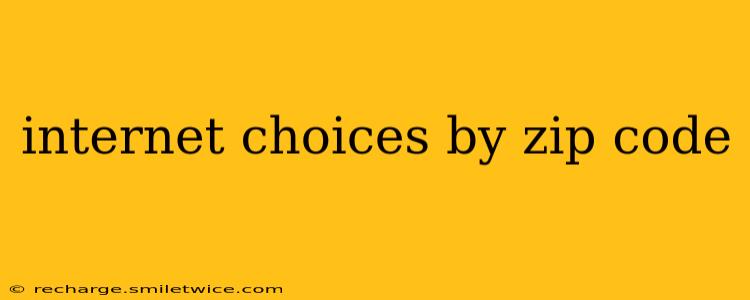Choosing the right internet provider can feel overwhelming. With so many options and varying speeds, prices, and technologies, finding the best fit for your specific zip code requires careful consideration. This comprehensive guide will help you navigate the process, uncovering the key factors to evaluate and empowering you to make an informed decision.
How to Find Internet Providers by Zip Code
The most straightforward method to discover internet providers available in your area is to simply enter your zip code on the websites of major internet providers like Comcast, Verizon, AT&T, Spectrum, and others. Many smaller, regional providers also exist, and searching online for "[your city/town] internet providers" will often reveal these options.
Comparison websites are another excellent resource. Sites like HighSpeedInternet.com and PCMag.com allow you to input your zip code to see a detailed comparison of available plans, speeds, and prices from various providers. These sites often include user reviews, helping you gauge the reliability and customer service of each provider.
Pro Tip: Don't rely solely on the advertised speeds. Real-world speeds can vary depending on several factors, including network congestion and the type of internet connection.
What Types of Internet Connections are Available?
Understanding the different types of internet connections is crucial to making the right choice. The most common options include:
- DSL (Digital Subscriber Line): Uses existing phone lines to deliver internet service. Generally offers slower speeds than other options.
- Cable Internet: Uses coaxial cables, typically providing faster speeds than DSL, but can be susceptible to congestion during peak hours.
- Fiber Optic Internet: Uses fiber optic cables, offering the fastest speeds and most reliable connection. However, availability is not universal.
- Satellite Internet: Uses satellites for connectivity, ideal for rural areas where other options are unavailable. However, latency (delay) can be higher, and speeds are often slower than other options.
- Fixed Wireless Internet: Uses radio waves to transmit data to a receiver at your location. Offers a good alternative in areas where cable or fiber isn't available.
What Factors Should I Consider When Choosing an Internet Provider?
Beyond simply looking at price, several key factors influence the optimal choice for your internet needs:
-
Download and Upload Speeds: Consider your internet usage. Streaming 4K video, online gaming, and video conferencing require significantly faster speeds than basic web browsing and email. Pay close attention to both download and upload speeds, as many activities utilize both.
-
Data Caps: Some providers impose data caps, limiting the amount of data you can use each month. Exceeding the cap can result in additional charges or reduced speeds.
-
Price: Compare the monthly cost of various plans, keeping in mind the speeds and data allowances included.
-
Contract Length: Consider whether you want a long-term contract or a month-to-month plan. Contracts often offer lower monthly rates but may involve early termination fees.
-
Customer Service: Read online reviews to gauge the quality of customer service provided by different companies. A reliable provider with responsive customer support is invaluable.
-
Bundled Services: Many providers offer bundles that combine internet, television, and phone services, potentially saving you money.
What is the Best Internet Provider for My Zip Code?
There's no single "best" provider for every zip code. The optimal choice depends on your individual needs and preferences. The best approach is to use the zip code search tools mentioned earlier, compare the available options based on the factors discussed above, and choose the provider that best aligns with your budget and internet usage patterns.
How Can I Compare Internet Speeds in My Area?
Several websites provide speed test tools that allow you to check your current internet speed. Ookla's Speedtest.net is a popular and reliable option. Running a speed test can help you assess whether your current provider meets your expectations or if you could benefit from upgrading to a faster plan or switching providers.
Are There Any Hidden Fees I Should Be Aware Of?
Yes, always review the provider's terms and conditions carefully. Hidden fees can include installation charges, early termination fees, equipment rental fees, and taxes. Understanding these potential costs upfront helps you accurately compare the total cost of different plans.
By carefully considering these factors and utilizing the available tools and resources, you can confidently navigate the world of internet providers and select the best option to meet your specific needs in your zip code. Remember, research is key to finding the right internet plan for you.
